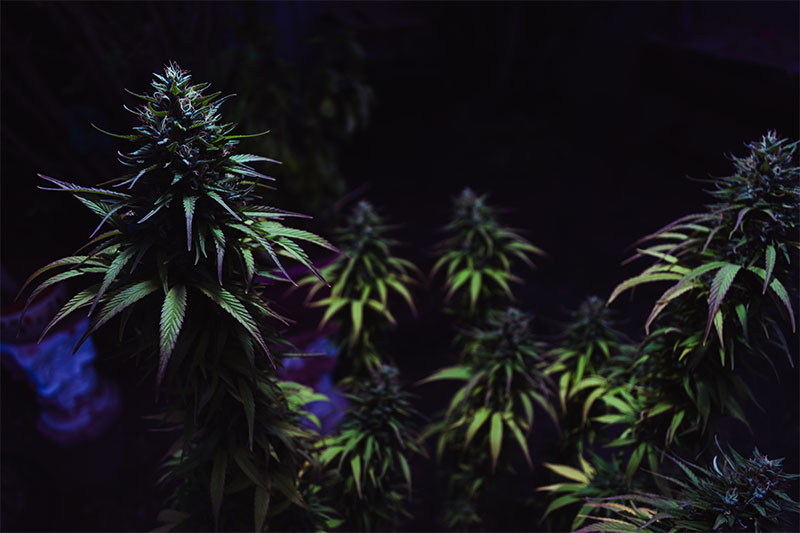
“Overblown marketing claims” and too many players on the market. As CBD sales decline, some are suggesting we’re witnessing the end of the craze.
Is CBD on its way out? Some recent headlines suggest so. Just a few years ago, CBD (cannabidiol, one of more than 100 cannabinoid compounds in the cannabis plant) was the biggest buzzword in the wellness and beauty industries, showing up in products ranging from tinctures, pills, teas, beverages (both alcoholic and non-alcoholic) to muscle balms, bath bombs, massage oils, face creams, and makeup.
Unlike THC, CBD doesn’t get you high, which was a big part of its appeal for those wary of cannabis. And its purported benefits were oh, so very many, including relief from pain, anxiety, and depression, anti-inflammatory and neuroprotective properties, antipsychotic effects, and more. Evidence for most of these claims is limited, at best, though this may be more the fault of legislation limiting research opportunities than of CBD itself.
The market was quickly saturated, despite legal ambiguities in many regions and a lack of regulatory framework in the USA. Major beauty retailers started adding it to products, luxury spas around the world added it to treatments and services, and chefs were cooking and baking with it. CBD was all the rage.
Until…it wasn’t?
Dramatic CBD sales decline
According to data from SPIN, via Natural Products Insider (NPI), in the year ending April 23, 2023, sales of supplements containing CBD as the primary functional ingredient in the US declined about 20% year over year (YOY) from about $54.5 million to roughly $44 million. NPI also reported that CBD marketers are facing financial challenges with decreased earnings and downsizing.
Meanwhile, in January, Glossy reported that Kristen Bell’s CBD skincare line, Happy Dance, would be shutting down due to waning interest in CBD beauty products. Launched in October 2020 in partnership with CBD brand Lord Jones, Happy Dance was stocked at CVS and Ulta Beauty. However, parent company, Cronos Group, recently announced that it has decided to shift its focus to direct-to-consumer adult-use products, exiting the wholesale beauty sector. This move also led to Lord Jones’ departure from Sephora. Glossy also reported that Google searches for CBD are down 61% year-over-year and skin-care related CBD searches have decreased by 86.9%.
Other beauty brands phasing out CBD include Wldkat. “In terms of the beauty market, CBD has not been received the way we all thought it would,” Wldkat founder Amy Zuzunegui, told Glossy.
What is causing the decline in CBD sales?
To what are people attributing this reported decrease in interest? Glossy’s take is that people actually just want to get high, which is something that, despite all its purported benefits, CBD doesn’t offer. And there appears to be truth there, though not necessarily the whole truth
When Brightfield Group’s 2023 CBD market data showed a weak 2022, the research firm set out to understand why. When they surveyed people about why they stopped using CBD. The reasons were as follows:
CBD is too expensive
CBD doesn’t work
User wanted psychoactive products
CBD is not convenient to buy
Anneke Knot, meanwhile, mused in an article in Fashionista, that “overblown marketing claims and the sheer number of brands created a level of CBD fatigue.”
NPI’s Frank Schultz also notes that the lack of regulatory framework from the FDA plays a big role. “The uncertainty about the legality of cannabinoids sold in supplement-like products has squelched investment and severely restricted distribution opportunities.”
Another reason, related to the lack of regulation, may be erosion of trust. Multiple studies have reportedly found that testing of unregulated cannabis products has revealed discrepancies between what is on the label and what is in the actual product.
What now for CBD in wellness, spa and beauty?
CBD’s moment has not definitively passed and it continues to maintain a solid consumer base. Volatility in emerging markets, particularly those as compelling and divisive as cannabis, is to be expected, and there was never any chance that every one of the thousands of brands that jumped in was going to survive.
The sector will stabilize, though in the US, the aforementioned lack of regulatory framework may continue to deter investors and send some companies in search of greener landscapes, like Canada, where recreational cannabis use is legal.
Cronos, for example, announced in May that it plans to bring Lord Jones “back to its adult-use roots” on the Canadian market, giving credence to the argument that people want psychoactive substances.
What we may see is a shift in consumer preference indicative of changing societal views and the de-stigmatization of cannabis as a recreational substance. Some consumers – emboldened by those first encounters with cannabis – will seek out products that combine the therapeutic effects of CBD with the psychoactive effects of THC.
Moreover, as the novelty of CBD wears off, the emphasis will probably shift to quality over quantity. Brands that prioritize transparency, rigorous testing, and high-quality sourcing will stand out in a crowded market. The lesson, as always, is that while fads may come and go, quality and genuine efficacy will usually win.
Ultimately, while the CBD hype may be dwindling, interest in holistic wellness, alternative therapies, and the broader potential of the cannabis plant is unlikely to wane. The demand for products that deliver tangible benefits, whether for relaxation, medicinal use, or simply the pursuit of a good high, will continue to shape the trajectory of the cannabis industry in the years to come.
Spa Executive is published by Book4Time, the leader in guest management, revenue and mobile solutions for the most exclusive spas, hotels, and resorts around the globe. Learn more at book4time.com.
Image by wirestock on Freepik



